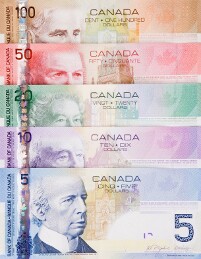The Canadian dollar is trading sideways against its US rival on Thursday as investors try to make sense of which direction the loonie is headed. The currency has tumbled to an 18-month low on crashing crude oil prices, and the currency was not helped by disappointing manufacturing data.
Canada exports many commodities, primarily crude oil, and the country runs a current account deficit. The economy could take a hit if the global flow of trade or capital cools down. Since oil is one of the nationâs biggest exports, the bear market is impacting the country, especially in oil-rich pockets like Alberta.
US crude prices crashed below $50 this week, and they are continuing their dissent towards the end of the trading week. February West Texas Intermediate (WTI) crude futures plunged $1.29, or 2.68%, to $46.89 per barrel on the New York Mercantile Exchange.
The falling energy prices did help bring down the annual inflation rate last month to 1.7%, the first time since February that inflation has been below the Bank of Canada (BOC)âs 2% target rate.
So, is Canada about to embark upon a recession because of falling energy prices? BOC governor Stephen Poloz does not think so, telling CTV News that âour fundamentals are quite solid,â which suggests the country is more likely to face âfender benders than big events.â
On the data front, Statistics Canada reported manufacturing sales fell 0.1% in October to $58.2 billion, stemming mostly from declining sales in wood products and primary metals. The market had forecast a 0.3% increase.
The lower inflation rates could mean that the central bank will not be as adamant in raising interest rates in the near-term. The next time the BOC raises rates could be in March, but the market is pegging the chances at around 23%.
Meanwhile, geopolitical tensions could impact the loonie moving forward. In the fallout of the arrest of Huawei executive Meng Wanzhou, the Chinese government could retaliate against Canada. Analysts are sounding the alarm that Beijing might target the Canadian dollar, something that could spur volatility in domestic financial markets.
The USD/CAD currency pair dipped 0.04% to 1.3477, from an opening of 1.3484, at 14:36 GMT on Thursday. The EUR/CAD rose 0.29% to 1.5385, from an opening of 1.5339.
If you have any questions, comments or opinions regarding the Canadian Dollar,
feel free to post them using the commentary form below.
Canadian Dollar Slides to 18-Month Low on Crude Prices, Manufacturing Data
